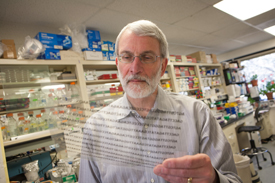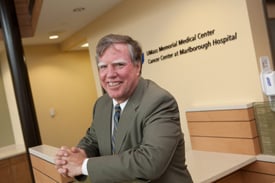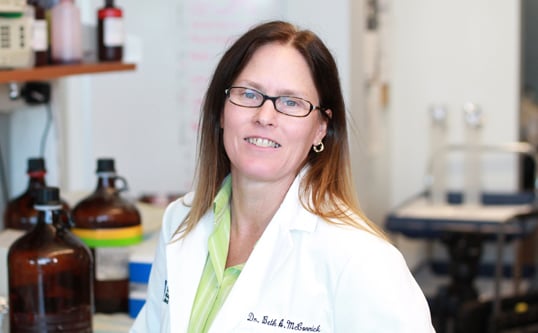The UMass Cancer Avatar Institute and the Center for Microbiome Research, two promising research projects at UMass Medical School, were supported in the latest round of University of Massachusetts President Robert L. Caret’s Science and Technology Initiatives Fund.

Dale Greiner, PhD
Dale Greiner, PhD, the Dr. Eileen L. Berman and Mr. Stanley I. Berman Foundation Chair in Biomedical Research and professor of molecular medicine, and Giles Whalen, MD, professor of surgery, were awarded $125,000 to develop the UMass Cancer Avatar Institute, a proposed multi-campus institute that would provide mice engineered as avatars of individual human patient tumors, enabling technology developed for diabetes research to be used to integrate biomarker identification platforms for multiple cancer types. The initiative has three components: establishment of a tumor bank, which has already begun via internal funds; clinical pathology evaluation of tumors in these specialized mice; and a new humanized mouse core to link the tumor bank to individual investigators in multiple cancer research fields. The project received an additional $25,000 matching grant from UMMS.
“As a member of the basic scientist community on campus working to translate our findings to the clinic, this award provides a structure that brings together the basic research community, clinical pathologists and clinicians to develop a team approach to find the causes and cure for cancer,” said Dr. Greiner.

Giles Whalen, MD
“We’re tremendously grateful to receive funding for this project, which helps move the UMass Cancer Center to the forefront of bench to bedside cancer research,” said Dr. Whalen. “What makes the UMass Cancer Avatar Institute such a powerful development is that it leverages our existing strengths, allowing UMass disease specific clinical teams to partner with our extraordinary scientific research base to focus on a patient’s own tumor growing in a highly specialized immune deficient mouse in the same way—and the same time—as it is growing in the patient. We can even engraft the patient’s immune system into that mouse and study how that immune system is or is not reacting to the tumor. In addition to advancing our understanding of immunotherapeutic approaches to treating cancer, this model provides a way to accelerate the discovery of biomarkers—signals that the tumor and patient shed into the blood stream as tumors progress or regress with treatment, which can help lead to early detection, among other things. It is also an excellent model for testing new therapeutic approaches and new drugs—in the mice before patients.”

Beth McCormick, PhD
Beth McCormick, PhD, professor of microbiology & physiological systems, was also awarded $125,000 to develop the Center for Microbiome Research, envisioned as a center of research and education for the microbiome, the ecosystem of the 100 trillion bacteria in the human body. The center will be developed in collaboration with UMass Amherst’s new Life Sciences Laboratories and the UMass Dartmouth Center for Scientific Computing and Data Visualization Research. The exploration of the microbiome—and its role in health, development and disease—is a vast and mostly untapped area of biomedical research and therapeutic potential. The center proposes to use advanced computational and bioinformatics to research microbiome-related genomic and clinical data and involves multiple industry partners. The project also received a $25,000 matching grant from UMMS.
“Receiving this award is very gratifying because it not only recognizes the remarkable breadth of talent across the UMass system vital to performing cutting-edge microbiome science but it also acknowledges the untapped potential and power of the microbiome in human health and disease,” said Dr. McCormick.
“Inside the gastrointestinal tract of humans live 100 trillion bacteria, a population 10 times the number of human cells in the body and containing 350 times the genomic material. This collection of microbes—and their genes—is termed the microbiome, and even just one segment of the human microbiome that is found in the intestine has profound influences on immune development, health and disease,” explained McCormick. “Because of this, the human microbiome is often referred to as the second genome, and is ripe for exploration. It is becoming increasingly recognized that changes within the complex community structure that comprise the microbiome are linked to certain diseases, such as inflammatory bowel disease, cancer, obesity, diabetes, autism and cardiovascular disease. Exploring the composition and function of these microbial community structures and the unique environments that drive these ecological niches, and by developing an understanding of how the microbiota interacts with itself and with its human host, hold great promise in the development of novel therapeutic breakthroughs and the advancement of personalized medicine.”
The goals of the President’s Science and Technology Initiatives Fund are to provide seed-level support to better position faculty researchers for larger, long-term investments; to advance strategic university research priorities; and to spur partnerships with state industry that leverage the university’s expertise while enhancing the competitiveness of companies that UMass is working with.
“With the level of the federal government’s support of R&D still in question, we must do all we can to support the university’s role in the state’s innovation economy,” said President Caret. “We are committed to strengthening our economic engagement in strategic areas such as clean energy, the environment, life sciences and big data, and these grants are another step in that direction.”
Other projects funded this year include the Center for Computational Climatology & Paleoclimatology by Robert DeConto and Raymond Bradley at UMass Amherst; the Mass. BioFoundry: Center for Discovery & Synthesis of Bioactive Molecules by Elizabeth Vierling and Susan Roberts at UMass Amherst; the Experimental Center for Environmental LIDAR (EXCEL) by Supriya Chakrabarti at UMass Lowell; the Next Generation Biomarker Development Pipeline Program by Jill Macoska at UMass Boston; and the UMass Center for Advanced Coatings by Mazdak Tootkaboni and Mehdi Raessi at UMass Dartmouth. A planning grant was awarded to David Kazmer at UMass Lowell for the Next Generation Materials & Processes for 3-D Printing.
Since 2004, the Science and Technology fund has provided $10 million to fund 80 projects, which in turn have helped to generate $240 million in funding from federal and private sources.